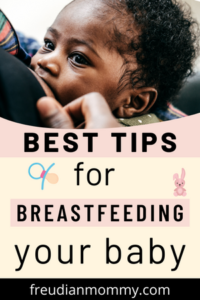15 Tips For Breastfeeding Your Baby Successfully
Breastfeeding is one of the best ways to nourish your newborn baby, particularly during the first few crucial months of life when they need good nutrition to grow.
However, although our bodies as mothers innately produce breast milk during pregnancy, there are often obstacles that can prevent us from nourishing our babies the right way.
As a mother of three, there are many things that I wish I had known about breastfeeding, especially with my first child, whom I had in the year 2016.
I have many regrets about things I didn’t know or could have done differently while breastfeeding my daughter. And although I am sure the information was available, I was not privy to it even though I gave birth at a top hospital. That’s why I am sharing these tips for breastfeeding your baby successfully. I want mothers worldwide to know the basics and importance of breastfeeding.
Also read: Things to Pack in Your Hospital Bag For Labor
Why you should breastfeed your baby:
Breast milk is considered the best food option for your baby because there are undeniable benefits for both mom and baby. Aside from being filled with nutrients that provide good nutrition to help your baby develop, your breastmilk supplies your baby with antibodies that strengthen your baby’s immune system and guard them from getting sick.
According to the American Academy of Pediatrics, breastfeeding is so essential to your baby’s well-being that they recommend exclusively breastfeeding your infant for the first six months before introducing any other complementary foods.
*This post contains affiliate links, at no additional cost to you I am compensated if you purchase after clicking on the links.*
Benefits of breastfeeding your newborn:

The fascinating thing about breastfeeding is that it is advantageous for both mom and baby.
Benefits of breastmilk for your baby:
-
- Provides your baby with nutrition that will help them develop and meet their physical milestones.
- It is easier to digest compared to formula.
- Filled with nutrients that will support and boost your newborn’s immune system.
- Protects them from illnesses that make them sick.
- Lowers your baby’s risk of allergies, asthma, and Sudden Infant Death Syndrome (SIDS).
- Decreases your baby’s risk of some cancers, developing adult diabetes, and from becoming overweight
- Gives you the chance to form a strong bond with your newborn.
- Breastfeeding is also a source of calm for your baby.
Benefits of breastfeeding for mom:
-
- Although painful, breastfeeding causes uterine contractions to help your uterus shrink to your post pregnancy size.
- Promotes weight loss through the burning of additional calories and helps you to lose the weight you gained during pregnancy.
- Lowers your risk of breast and ovarian cancer.
- Saves you thousands of dollars from buying formula.
- And saves you time that you won’t have after having a baby.
Questions to ask yourself before you start breastfeeding?
As a mom, I know you want the best for your newborn baby and want them to have the best start and chance at life. However, although breastfeeding is valuable for both mom and baby, and is recommended exclusively for the first six months of your baby’s life, there may be many reasons as to why you can’t meet that recommendation.
Before you start your breastfeeding journey, it’s essential to set goals so you can develop a plan that will set you up for success.
Also read: 25 Things To Do Before Baby Arrives
Here are a few questions to ask yourself before you start breastfeeding:
How long do you plan to breastfeed?
Do you plan on staying home with your child, or will you be returning to work?
What obstacles do you foresee hindering you from exclusively breastfeeding your baby for the first six months?
15 Best Tips for breastfeeding successfully
1) Make a decision about breastfeeding:
Decide whether you are going to breastfeed your baby or not. Take some time, even if it’s months leading up to your due date to think about whether you will breastfeed or formula-feed your baby.
Yes, breast milk is the preferred food for your newborn but formula is also a secondary option. Discuss your decision with your OBGYN or midwife so that if you do decide you want to breastfeed they will provide you with the resources to be successful, and if you decide not to breastfeed they can talk to you about why you choose not to breastfeed and support you in your decision.
2) The condition of your mindset matters:
The way you prepare your mind for breastfeeding your baby will make a big difference in how successful you are in breastfeeding your baby.
As a pregnant new momma-to-be, I was set on not breastfeeding. Deciding not to breastfeed was rooted in deep personal issues that I had to address and overcome.
I had always sexualized my breasts and never thought of them as anything else. And so, attaching a baby to my breast for nourishment sounded like an invasion of personal privacy.
After multiple talks with my OBGYN and nurse, and learning about the benefits of breastfeeding my baby, I changed my mind about breastfeeding. It was truly the best decision and experience for me and my baby. Moving forward, I breastfed all three babies without any negative thoughts.
3) Trust in your body’s ability to breastfeed and nurture your child:
Breastfeeding may seem like an intimidating experience. But, as a woman, your body is naturally created to produce breast milk during pregnancy to prepare for breastfeeding your baby. Have confidence and trust in yourself, your womanhood, and your body’s ability to provide the best nourishment for your newborn.
4) Set a short-term goal on how long you plan to breastfeed:
Although the American Academy of Pediatrics recommends exclusively breastfeeding your baby for the first six months for the best developmental outcomes, remember that any breastfeeding is better than no breastfeeding.
Set a small short-term goal on how long you plan to breastfeed and take it from there. For example, set your first goal for 4 weeks then to 8 weeks, and so on.
5) Breastfeed your baby as soon as possible after birth:
The most important tip for breastfeeding your newborn is to breastfeed your baby as soon as possible after birth. The sooner you feed your baby after birth, the better. The World Health Organization recommends you breastfeed your newborn preferably within the first hour so that they may receive the full benefits of the colostrum.
Colostrum is a thick and yellow fluid- the first milk your body produces- filled with all the nutrients your newborn needs to thrive before your milk supply comes in. Plus, the sooner you breastfeed your baby, the sooner your milk supply will come in.
6) Don’t pump for the first six weeks:
Not everyone can do this, but if you are staying home with your baby, don’t pump for the first six weeks, not that you’ll be able to. For the first couple of months of your baby’s life, they will be nursing every 1-3 hours. You will also have times when you are cluster-feeding your baby, which means they will be nursing frequently. Don’t stress yourself thinking you have to pump during this time.
7) Breastfeed your baby on demand:
Feed your baby when they show early signs of hunger. Your newborn should be nursing every 1-3 hours or at least 8 times minimum in a 24-hour period. The more you nurse your baby, the more milk your body will produce. Vice versa, the less you feed your baby, the more limited your milk supply will become.

8) Breastfeed from both breasts:
Breastfeeding your baby from both sides will ensure that your milk supply is up on both sides. In the event you are not able to feed your baby from both breasts, pump to keep your milk supply coming in.
Also read: Baby Checklist: What You Actually Need To Care For Your Baby
9) Stay on top of your baby’s breastfeeding schedule:
It’s easy to lose track of time, especially when it seems like you’re constantly nursing your baby. Use a schedule and set up a timer to help you stay on top of your baby’s feeding schedule. This is important if you have a sleeper in your hands.
10) Have the breastfeeding essentials on hand:
Nursing your baby will be much easier if you have all that you need on hand. Below are the essential items you will need to be successful at nursing your baby.
- Rocking chair
- Breast pump
- Manual breast pump
- Extra pump parts
- Breastmilk storage bags or containers
- Portable storage for breastmilk
- Bottles
- Boppy nursing pillow
- Nursing cover
- Bibs (8-10)
- Bottlebrush
- Bottle warmer
- Bottle sterilizer
- Bottle drying rack
- Nursing bras (2-4)
- Nipple cream
- Nursing pads
- Footstool

11) Learn about breastfeeding:
Honestly, the more knowledgeable you are about breastfeeding, the easier it is to breastfeed your baby the correct way.
12) Skin-to-skin:
Your baby’s journey into the world was not easy. Your baby is tired from the long trip. Comfort them by doing skin-to-skin contact. Skin-to-skin not only helps you to bond with your baby, but it also helps to regulate your baby’s body temperature, heart rate, and breathing.
13) Keep your energy up:
Breastfeeding takes up a lot of energy. For this reason, it is essential to maintain a well-balanced and healthy diet. It is recommended that you add an additional 500 calories to your diet while breastfeeding to keep your energy up.
14) Water is your best friend:
Your body uses water to produce milk. Drinking plenty of water will not only keep you hydrated and also keep your milk supply coming in.
15) Ask for help:
Breastfeeding requires a lot of support particularly in the first few months when you will be cluster feeding. If you have family nearby, ask for help, especially if you have other children.
Final words on breastfeeding tips
Breastfeeding is a crucial aspect of nourishing your baby. Although breastfeeding can be challenging for some moms, it is important to find ways to overcome obstacles that will interrupt you from exclusively breastfeeding your baby for the first six months. I wish you the best on your breastfeeding journey mama!
Related articles:
20 Powerful Bible Verses To Use As Birth Affirmations In Preparation For Childbirth
How Long Does It Take To Heal After Giving Birth? 4 Helpful Tips For Your Recovery
Breastfeeding Must Haves: 3 Things That Made My Breastfeeding Experience Stress Free!
18 Best Postpartum Must Haves For Your Postpartum Care Kit
15 Tips For Breastfeeding Your Baby Successfully













